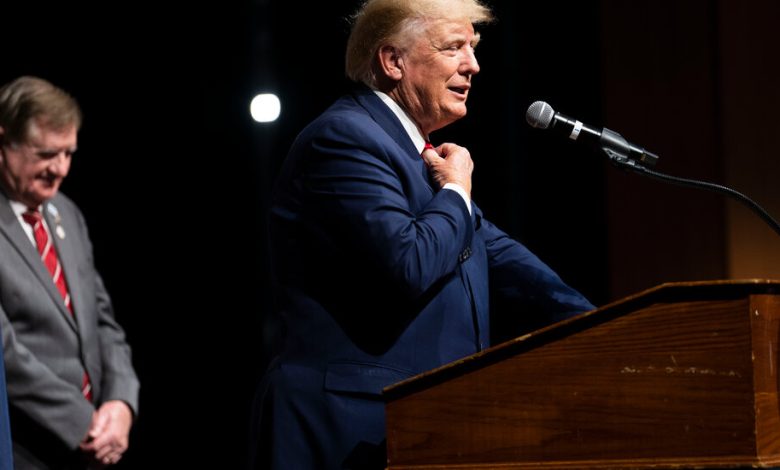Trump Spent $10 Million From His PAC on His Legal Bills Last Year

Former President Donald J. Trump, who throughout his business career had a reputation for not paying lawyers, spent roughly $10 million from his political action committee on his own legal fees last year, federal election filings show.
The money that went to Mr. Trump’s legal bills was part of more than $16 million that Mr. Trump’s PAC, Save America, spent for legal-related payments in 2021 and 2022, the filings show.
Some of the $16 million appears to have been for lawyers representing witnesses in investigations related to Mr. Trump’s efforts to cling to power. But the majority of it — about $10 million — went to firms directly representing Mr. Trump in a string of investigations and lawsuits, including some related to his company, the filings showed.
Mr. Trump was well-known in New York City before winning the presidency in 2016 for refusing to pay his bills to a wide range of service providers and contractors. Lawyers were no exception, with Mr. Trump often saying people got free advertising by being involved with him.
The recent spending related to Mr. Trump is notable not just for the sheer volume — it represented about 19 percent of the PAC’s total expenditures outside of transfers to one of his other political committees and those backing other candidates — but also because Mr. Trump is now a declared candidate for president again.
Some campaign finance experts are raising questions about whether, as a candidate, Mr. Trump can continue to use the PAC to pay for his personal legal bills. Those questions are arising as he faces legal challenges on various fronts as well as intense scrutiny by the Justice Department and prosecutors in Georgia and New York.
According to some campaign finance experts, having the PAC continue to pay his legal bills now that he is a candidate would be seen as a contribution to him, and therefore be subject to legal limits.
“Payments by a PAC that exceed the contribution limit are contributions to the candidate and are unlawful,” said Jason Torchinsky, a campaign finance expert and lawyer with the firm Holtzman Vogel, referring to the limit on individual donations to candidates, which is set at $3,300 for the current two-year political cycle.
Adav Noti, of the Campaign Legal Center, a group that has called on the Federal Election Commission to more strictly enforce the rules on personal use of campaign donations, called what is permissible a “gray area.” The Federal Election Commission has yet to provide the guidance on the issue that campaign finance experts have sought.
The vast majority of Mr. Trump’s PAC money was raised before he officially entered the 2024 presidential race on Nov. 15. At the end of last year, the PAC had just over $18 million in cash on hand, its federal filings show.
The Justice Department has been subpoenaing documents from vendors paid by the PAC, including law firms, in an effort to determine what they were being paid for.
A spokesman for Mr. Trump did not respond to an email asking if Mr. Trump would still use Save America for his personal legal bills. Mr. Trump’s PAC was formed in late 2020 after the November election, as Mr. Trump was raising massive sums of money by vowing to fight what he claimed was widespread election fraud.
Mr. Trump spent some of the money on fruitless efforts to show widespread election fraud. He also used it to defend against various matters related to the attack on the Capitol by a pro-Trump mob on Jan. 6, 2021. The PAC that Mr. Trump’s advisers set up allowed for general use of the money so long as it did not directly support a future candidacy.
The single biggest payment that Mr. Trump made from the PAC money to a law firm last year — $3 million — went to the Florida-based law firm Critton, Luttier and Coleman, which is affiliated with Christopher M. Kise, a former solicitor general of Florida. Mr. Kise joined Mr. Trump’s team initially to take on the Mar-a-Lago documents case and he is now involved in defending Mr. Trump and his company in a fraud suit filed by the New York attorney general, Letitia James.
An additional $930,000 went to Continental, a law firm at which Mr. Kise is of counsel, the filings show.
Another $1.3 million went to Silverman Thompson Slutkin and White, the firm of Evan Corcoran, a lawyer who began working with Mr. Trump last spring. Mr. Corcoran was brought into Mr. Trump’s orbit by Boris Epshteyn, a strategist who has played a coordinating role with some of the lawyers in cases involving Mr. Trump, as the investigation related to the Mar-a-Lago documents was heating up. (Mr. Epshteyn’s company was paid $195,000, but for broader strategic consulting, not legal consulting specifically.)
The Justice Department recently filed a motion to compel Mr. Corcoran, who has appeared before a federal grand jury investigating Mr. Trump’s handling of classified documents, to give additional testimony, citing the crime-fraud exception to attorney-client privilege. The request means that prosecutors have reason to believe that legal advice or legal services may have been used by Mr. Trump or one of his allies in furthering a crime.
Another roughly $1.2 million was paid to Ifrah Law, the firm of Jim Trusty, a former federal prosecutor who Mr. Trump saw on television and decided to hire.
Roughly $1.3 million went to the law firm of Michael van der Veen. Mr. van der Veen represented Mr. Trump in his second impeachment trial and last year represented the Trump Organization in a tax fraud prosecution brought by the Manhattan district attorney. Mr. Trump’s company lost on all 17 counts.
Another roughly $2 million was paid to the firm of Alina Habba, who represents Mr. Trump in a number of suits, including the New York attorney general suit and two suits brought by E. Jean Carroll, a New York writer who says Mr. Trump raped her in a department store changing room in the 1990s.
Ms. Habba is also representing Mr. Trump in a suit against The New York Times for its reporting on Mr. Trump’s tax returns, a defamation case in Pennsylvania, and in a case against Mr. Trump’s former lawyer and fixer, Michael Cohen.
There have been various smaller payments for a constellation of other lawyers who have worked with Mr. Trump on issues including the investigation in Fulton County, Ga., into possible violations of election law and the subpoena he received from the House Jan. 6 committee. Those lawyers include Jesse Binnall, Harmeet Dhillon and Tim Parlatore, as well as the firms Earth and Water, Level Law, Weber Crabb and Wein and Wilenchik and Bartness.
Some of those firms also represent or advise other witnesses in the investigations related to Mr. Trump, such as the former White House adviser Peter Navarro.
One person for whom the money has not been used is Rudolph W. Giuliani, Mr. Trump’s former personal lawyer. Mr. Trump told aides in late 2020 that he did not want Mr. Giuliani paid for his work on Mr. Trump’s behalf unless he succeeded in undoing the election results, and Mr. Giuliani’s own legal fees have not been covered by Save America.
The questions of which lawyers and vendors have been paid, and for what, intensified after the House select committee investigating Mr. Trump’s efforts to cling to power told the Justice Department that it had evidence that a lawyer representing a witness had tried to coach her testimony in ways that would be favorable to Mr. Trump. The witness in question was later identified by people familiar with the committee’s work as Cassidy Hutchinson, a former White House aide.
Her lawyer at the time, Stefan Passantino, was a former White House deputy counsel under Mr. Trump and was paid through Save America.




